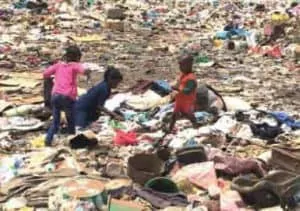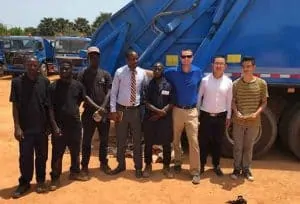

SWANA recently announced the winners of the SWDC competition hosted by SWANA’s Young Professionals Group. The competition aims at providing design experience to students interested in pursuing an education or career in solid waste management. The outcome is that all participants are winners, gathering real-world experience to help solve complex solid waste management issues in a supportive environment.
Seven universities participated in the competition: Arizona State University, Wayne State University, University of Southern California, University of Vermont, the University of Texas at Arlington, University of British Columbia, and the National University of Engineering in Peru.

“Our team of judges was impressed with how this group of student design teams engaged in understanding this solid waste challenge plaguing The Gambia,” Competition judge and SCS Engineers Project Manager, Chris Jimieson, says. “The students developed diverse designs that we believe will become part of the eventual solution of constructing The Gambia’s first engineered, sanitary landfill.”
The judging panel included John Welch, Director of the Dane County Department of Waste & Renewables; Kaba Bah, Principal Manager at the Midwest GOOH Group in Madison, WI; Lamin Sanyang, Director of Services at Kanifing Municipal Council in The Gambia; and our own Chris Jimieson. The judges have a long association with the Bakoteh Dumpsite.
The SWANA Awards Ceremony features two guest speakers, including David Biderman, CEO and Executive Director of SWANA, and Mayor Talib Ahmed Bensouda, Lord Mayor of the Kanifing Municipality, The Gambia. Mayor Bensouda explains in the video how the Bakoteh Dumpsite became a significant problem for the growing community and the solutions they are using to fix it.
Chris Jimieson provides us with an update from his travels to The Gambia in Africa to evaluate their solid waste challenges.

In October 2020, I presented The Gambia situation as a design project to college students worldwide that wanted to compete in the SWANA YP’s International Solid Waste Design Competition. We asked them to provide a closure plan for the Bakoteh Dumpsite, provide a conceptual design for a new sanitary landfill, and share some cost estimates for each of these endeavors. Seven teams from across the Americas decided to compete. If you are interested, please browse through student design posters, reports, and presentations or contact me, Chris Jimieson.
Thanks to the SWANA YPs, my SCS colleagues, and so many who volunteered to help elevate this project to the international stage.
Building a better solid waste management infrastructure is a top priority for the City of Madison’s sister city, Kanifing, in The Gambia, Africa; and Wisconsin solid waste professionals are helping.
When Kanifing began placing municipal waste in an old quarry on the outskirts 40 years ago, it seemed like a good idea. Today, the 45-acre unlined Bakoteh dump lies in the residential heart of The Gambia’s largest municipality, Kanifing, and it’s causing problems for the community.
The good news is that work is underway to modernize the solid waste practices:
Get more background on what’s driving the need for action, meet the team of stakeholders working together to drive positive changes, and learn more about the progress they’ve made by viewing this video from your friends and colleagues at SCS Engineers.
If you’re interested in learning more Chris Jimieson is happy to help.